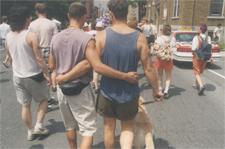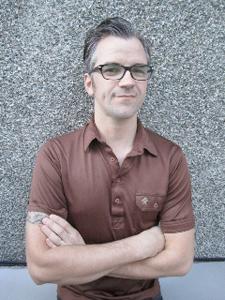
Photo of Pride 1994 Credit: Shawn Scallen
People often tell Grant Burke that they have nothing to say to him.
It’s surprising, since he seems supremely easy to talk to. As soon as he walks into my house, he starts in with a warm patter, even though he’s dripping wet from the cold rain.
Not to mention the really interesting project he’s here to tell me about.
As a history student at Carleton, Burke is tracing how queers in the Ottawa/Gatineau region have navigated their cities in decades past. Through examining oral history, he’s trying to understand the lives of the people who lived here from the 1960s through the ’90s.
When I ask him if it has been easy to find people, he shakes his head emphatically. Finding people hasn’t been hard – but convincing them they’re worthy has.
“One thing I get a lot is people saying, ‘I don’t know if I have anything to say. I don’t know if I’ve done anything special,’” he explains. “But the whole point of this history is not to do a history of activism… but more like, how did people create spaces for themselves in this city, in their day-to-day lives, to meet other people? I call it a social-spatial history.”
Burke came to this project gradually. Though he’s always been interested in urban spaces, it was during his two years as a bike messenger in Montreal that his fascination was cemented.
“I’d be pedalling through the city, and I’d go under an underpass and come out the other end, and suddenly there’s a completely different character to the neighbourhood. And those barriers really fascinated me — those physical barriers.”
Then, during his undergrad at the University of Maryland, writing about bicycles in the 19th century, he “got more into it and realized that there’s government barriers, there’s policy and planning barriers, there’s race barriers and class barriers. There’s gendered barriers.”
When he moved to Ottawa to do his master’s, it made sense to combine his enduring interest in urban history with the city in which he was living.
One gets the sense, too, that his project is borne out of a personal frustration that the information is so hard to find.
“Gay history, queer history — it’s not something that’s passed down,” he tells me, pointing out that “kids don’t have a gay grandpa telling them how to go cruise the canal.”
While none of his interviewees has (so far) given him cruising tips, the interviews and research he’s done have offered up some interesting tidbits.
There’s the Lord Elgin, for years a straight-owned place with a gay clientele. There’s the gay club in the basement of a civil service building in Hull, away from better-known clubs like Chez Henri and Le Pub. Someone told him that Laurier Ave in Ottawa was once considered a cruising strip. There are stories of house parties in the ’60s and ’70s, kept indoors so they were difficult to regulate. There’s the 19th-century record of “indecent” behaviour in Major’s Hill Park. These details have disappeared from the collective memory — if they were ever there— and they’re what Burke wants to save.
While he wants to have his thesis done by this time next year, he’s hoping that the project lives on past his degree. He wants his blog to flourish as a collaborative history of how our gay city has changed over the decades.
“This is my way of immortalizing some really brave people,” he says, “who in the ’70s, in Ottawa, came out…. They went to the Lord Elgin when it was risky. They decided to slowly define themselves as gay or lesbian. I wouldn’t have done it…. That needs to be remembered.”
But not only that.
“Ultimately, as a historian you’re telling a story. Hopefully. And hopefully, I’ll be able to tell a good story… maybe not the story that everyone thinks of.” While Burke can connect an individual’s actions with the grander story of the struggle for gay rights in Ottawa, what’s harder to find are the ephemeral moments that make a life. He’d tell potential interviewees,“[I want] your visceral experiences. I want your emotions, your sense of fun, your sense of defiance, your sense of fear… the past is all those things.”
If you’d like to help Grant write the story of our queer history, he’d love for you to contact him for an in-person, phone or email interview of any length. He wants to speak to anyone who has tales to tell about the gay Ottawa of decades past — and he knows you really do have something to say.
Find Burke at queerottawahistory.blogspot.com.

 Why you can trust Xtra
Why you can trust Xtra


